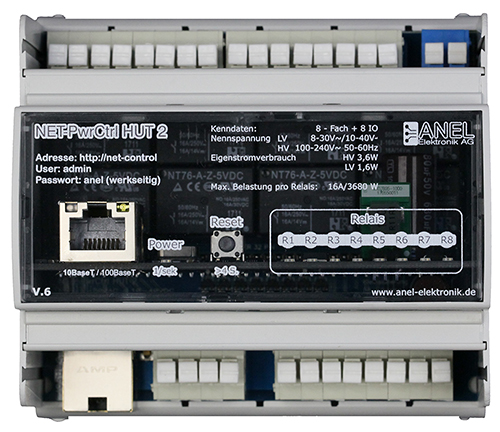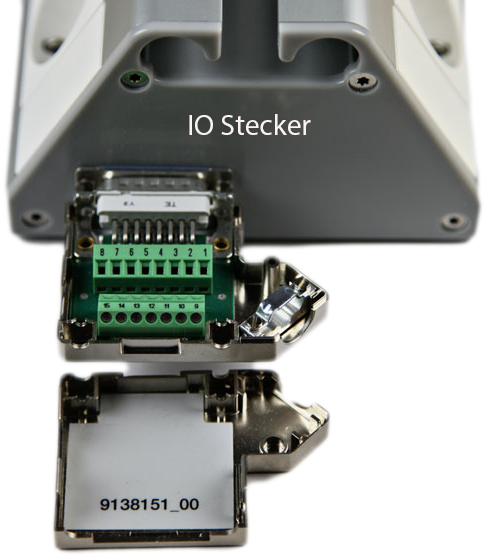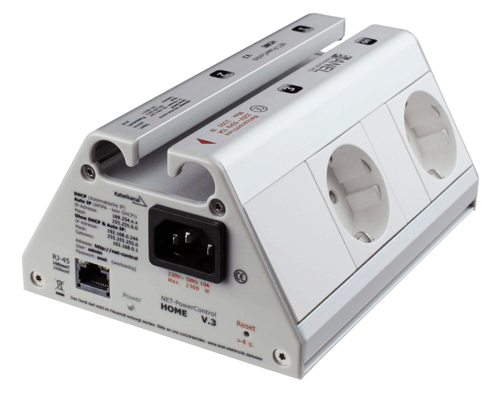# Anel NET-PwrCtrl Binding

Monitor and control Anel NET-PwrCtrl devices.
NET-PwrCtrl devices are power sockets / relays that can be configured via browser but they can also be controlled over the network, e.g. with an Android or iPhone app - and also with openHAB via this binding. Some NET-PwrCtrl devices also have 8 I/O ports which can either be used to directly switch the sockets / relays, or they can be used as general input / output switches in openHAB.
# Supported Things
There are three kinds of devices (overview on manufacturer's homepage (opens new window)):
| Anel NET-PwrCtrl HUT (opens new window) ( advanced-firmware ) | Anel NET-PwrCtrl IO (opens new window) ( advanced-firmware ) | Anel NET-PwrCtrl HOME (opens new window) ( home ) (only German version) |
|---|---|---|
 (opens new window) (opens new window) |  (opens new window) (opens new window) |  (opens new window) (opens new window) |
Thing type IDs:
- home: The smallest device, the HOME, is the only one with only three power sockets and only available in Germany.
- simple-firmware: The PRO and REDUNDANT have eight power sockets and a similar (simplified) firmware as the HOME.
- advanced-firmware: All others (ADV, IO, and the different HUT variants) have eight power sockets / relays, eight IO ports, and an advanced firmware.
An additional sensor (opens new window) may be used for monitoring temperature, humidity, and brightness. The sensor can be attached to a HUT device via an Ethernet cable (max length is 50m).
# Discovery
Devices can be discovered automatically if their UDP ports are configured as follows:
- 75 / 77 (default)
- 750 / 770
- 7500 / 7700
- 7750 / 7770
If a device is found for a specific port (excluding the default port), the subsequent port is also scanned, e.g. 7500/7700 → 7501/7701 → 7502/7702 → etc.
Depending on the network switch and router devices, discovery may or may not work on wireless networks. It should work reliably though on local wired networks.
# Thing Configuration
Each Thing requires the following configuration parameters.
| Parameter | Type | Default | Required | Description |
|---|---|---|---|---|
| Hostname / IP address | String | net-control | yes | Hostname or IP address of the device |
| Send Port | Integer | 75 | yes | UDP port to send data to the device (in the anel web UI, it's the receive port!) |
| Receive Port | Integer | 77 | yes | UDP port to receive data from the device (in the anel web UI, it's the send port!) |
| User | String | user7 | yes | User to access the device (make sure it has rights to change relay / IO states!) |
| Password | String | anel | yes | Password of the given user |
For multiple devices, please use exclusive UDP ports for each device. Ports above 1024 are recommended because they are outside the range of system ports.
Possible entries in your thing file could be (thing types home, simple-firmware, and advanced-firmware are explained above in Supported Things):
anel:home:mydevice1 [hostname="192.168.0.101", udpSendPort=7500, udpReceivePort=7700, user="user7", password="anel"]
anel:simple-firmware:mydevice2 [hostname="192.168.0.102", udpSendPort=7501, udpReceivePort=7701, user="user7", password="anel"]
anel:advanced-firmware:mydevice3 [hostname="192.168.0.103", udpSendPort=7502, udpReceivePort=7702, user="user7", password="anel"]
anel:advanced-firmware:mydevice4 [hostname="192.168.0.104", udpSendPort=7503, udpReceivePort=7703, user="user7", password="anel"]
# Channels
Depending on the thing type, the following channels are available.
| Channel ID | Item Type | Supported Things | Read Only | Description |
|---|---|---|---|---|
| prop#name | String | all | yes | Name of the device |
| prop#temperature | Number:Temperature | simple / advanced | yes | Temperature of the integrated sensor |
| sensor#temperature | Number:Temperature | advanced | yes | Temperature of the optional external sensor |
| sensor#humidity | Number | advanced | yes | Humidity of the optional external sensor |
| sensor#brightness | Number | advanced | yes | Brightness of the optional external sensor |
| r1#name | String | all | yes | Name of relay / socket 1 |
| r2#name | String | all | yes | Name of relay / socket 2 |
| r3#name | String | all | yes | Name of relay / socket 3 |
| r4#name | String | simple / advanced | yes | Name of relay / socket 4 |
| r5#name | String | simple / advanced | yes | Name of relay / socket 5 |
| r6#name | String | simple / advanced | yes | Name of relay / socket 6 |
| r7#name | String | simple / advanced | yes | Name of relay / socket 7 |
| r8#name | String | simple / advanced | yes | Name of relay / socket 8 |
| r1#state | Switch | all | no * | State of relay / socket 1 |
| r2#state | Switch | all | no * | State of relay / socket 2 |
| r3#state | Switch | all | no * | State of relay / socket 3 |
| r4#state | Switch | simple / advanced | no * | State of relay / socket 4 |
| r5#state | Switch | simple / advanced | no * | State of relay / socket 5 |
| r6#state | Switch | simple / advanced | no * | State of relay / socket 6 |
| r7#state | Switch | simple / advanced | no * | State of relay / socket 7 |
| r8#state | Switch | simple / advanced | no * | State of relay / socket 8 |
| r1#locked | Switch | all | yes | Whether or not relay / socket 1 is locked |
| r2#locked | Switch | all | yes | Whether or not relay / socket 2 is locked |
| r3#locked | Switch | all | yes | Whether or not relay / socket 3 is locked |
| r4#locked | Switch | simple / advanced | yes | Whether or not relay / socket 4 is locked |
| r5#locked | Switch | simple / advanced | yes | Whether or not relay / socket 5 is locked |
| r6#locked | Switch | simple / advanced | yes | Whether or not relay / socket 6 is locked |
| r7#locked | Switch | simple / advanced | yes | Whether or not relay / socket 7 is locked |
| r8#locked | Switch | simple / advanced | yes | Whether or not relay / socket 8 is locked |
| io1#name | String | advanced | yes | Name of IO port 1 |
| io2#name | String | advanced | yes | Name of IO port 2 |
| io3#name | String | advanced | yes | Name of IO port 3 |
| io4#name | String | advanced | yes | Name of IO port 4 |
| io5#name | String | advanced | yes | Name of IO port 5 |
| io6#name | String | advanced | yes | Name of IO port 6 |
| io7#name | String | advanced | yes | Name of IO port 7 |
| io8#name | String | advanced | yes | Name of IO port 8 |
| io1#state | Switch | advanced | no ** | State of IO port 1 |
| io2#state | Switch | advanced | no ** | State of IO port 2 |
| io3#state | Switch | advanced | no ** | State of IO port 3 |
| io4#state | Switch | advanced | no ** | State of IO port 4 |
| io5#state | Switch | advanced | no ** | State of IO port 5 |
| io6#state | Switch | advanced | no ** | State of IO port 6 |
| io7#state | Switch | advanced | no ** | State of IO port 7 |
| io8#state | Switch | advanced | no ** | State of IO port 8 |
| io1#mode | Switch | advanced | yes | Mode of port 1: ON = input, OFF = output |
| io2#mode | Switch | advanced | yes | Mode of port 2: ON = input, OFF = output |
| io3#mode | Switch | advanced | yes | Mode of port 3: ON = input, OFF = output |
| io4#mode | Switch | advanced | yes | Mode of port 4: ON = input, OFF = output |
| io5#mode | Switch | advanced | yes | Mode of port 5: ON = input, OFF = output |
| io6#mode | Switch | advanced | yes | Mode of port 6: ON = input, OFF = output |
| io7#mode | Switch | advanced | yes | Mode of port 7: ON = input, OFF = output |
| io8#mode | Switch | advanced | yes | Mode of port 8: ON = input, OFF = output |
* Relay / socket state is read-only if it is locked; otherwise it is changeable.
** IO port state is read-only if its mode is input, it is changeable if its mode is output.
# Full Example
.things file:
Thing anel:advanced-firmware:anel1 "Anel1" [hostname="192.168.0.100", udpSendPort=7500, udpReceivePort=7700, user="user7", password="anel"]
.items file:
// device properties
String anel1name "Anel1 Name" {channel="anel:advanced-firmware:anel1:prop#name"}
Number:Temperature anel1temperature "Anel1 Temperature" {channel="anel:advanced-firmware:anel1:prop#temperature"}
// external sensor properties
Number:Temperature anel1sensorTemperature "Anel1 Sensor Temperature" {channel="anel:advanced-firmware:anel1:sensor#temperature"}
Number anel1sensorHumidity "Anel1 Sensor Humidity" {channel="anel:advanced-firmware:anel1:sensor#humidity"}
Number anel1sensorBrightness "Anel1 Sensor Brightness" {channel="anel:advanced-firmware:anel1:sensor#brightness"}
// relay names and states
String anel1relay1name "Anel1 Relay1 name" {channel="anel:advanced-firmware:anel1:r1#name"}
Switch anel1relay1locked "Anel1 Relay1 locked" {channel="anel:advanced-firmware:anel1:r1#locked"}
Switch anel1relay1state "Anel1 Relay1" {channel="anel:advanced-firmware:anel1:r1#state"}
Switch anel1relay2state "Anel1 Relay2" {channel="anel:advanced-firmware:anel1:r2#state"}
Switch anel1relay3state "Anel1 Relay3" {channel="anel:advanced-firmware:anel1:r3#state"}
Switch anel1relay4state "Anel1 Relay4" {channel="anel:advanced-firmware:anel1:r4#state"}
Switch anel1relay5state "Light Bedroom" {channel="anel:advanced-firmware:anel1:r5#state"}
Switch anel1relay6state "Doorbell" {channel="anel:advanced-firmware:anel1:r6#state"}
Switch anel1relay7state "Socket TV" {channel="anel:advanced-firmware:anel1:r7#state"}
Switch anel1relay8state "Socket Terrace" {channel="anel:advanced-firmware:anel1:r8#state"}
// IO port names and states
String anel1io1name "Anel1 IO1 name" {channel="anel:advanced-firmware:anel1:io1#name"}
Switch anel1io1mode "Anel1 IO1 mode" {channel="anel:advanced-firmware:anel1:io1#mode"}
Switch anel1io1state "Anel1 IO1" {channel="anel:advanced-firmware:anel1:io1#state"}
Switch anel1io2state "Anel1 IO2" {channel="anel:advanced-firmware:anel1:io2#state"}
Switch anel1io3state "Anel1 IO3" {channel="anel:advanced-firmware:anel1:io3#state"}
Switch anel1io4state "Anel1 IO4" {channel="anel:advanced-firmware:anel1:io4#state"}
Switch anel1io5state "Switch Bedroom" {channel="anel:advanced-firmware:anel1:io5#state"}
Switch anel1io6state "Doorbell" {channel="anel:advanced-firmware:anel1:io6#state"}
Switch anel1io7state "Switch Office" {channel="anel:advanced-firmware:anel1:io7#state"}
Switch anel1io8state "Reed Contact Door" {channel="anel:advanced-firmware:anel1:io8#state"}
.sitemap file:
sitemap anel label="Anel NET-PwrCtrl" {
Frame label="Device and Sensor" {
Text item=anel1name label="Anel1 Name"
Text item=anel1temperature label="Anel1 Temperature [%.1f °C]"
Text item=anel1sensorTemperature label="Anel1 Sensor Temperature [%.1f °C]"
Text item=anel1sensorHumidity label="Anel1 Sensor Humidity [%.1f]"
Text item=anel1sensorBrightness label="Anel1 Sensor Brightness [%.1f]"
}
Frame label="Relays" {
Text item=anel1relay1name label="Relay 1 name" labelcolor=[anel1relay1locked==ON="green",anel1relay1locked==OFF="maroon"]
Switch item=anel1relay1state
Switch item=anel1relay2state
Switch item=anel1relay3state
Switch item=anel1relay4state
Switch item=anel1relay5state
Switch item=anel1relay6state
Switch item=anel1relay7state
Switch item=anel1relay8state
}
Frame label="IO Ports" {
Text item=anel1io1name label="IO 1 name" labelcolor=[anel1io1mode==OFF="green",anel1io1mode==ON="maroon"]
Switch item=anel1io1state
Switch item=anel1io2state
Switch item=anel1io3state
Switch item=anel1io4state
Switch item=anel1io5state
Switch item=anel1io6state
Switch item=anel1io7state
Switch item=anel1io8state
}
}
The relay / IO port names are rarely useful because you probably set similar (static) labels for the state items.
The locked state / IO mode is also rarely relevant in practice, because it typically doesn't change.
.rules file:
rule "doorbell only at daytime"
when Item anel1io6state changed then
if (now.getHoursOfDay >= 6 && now.getHoursOfDay <= 22) {
anel1relay6state.sendCommand(if (anel1io6state.state != ON) ON else OFF)
}
someNotificationItem.sendCommand("Someone just rang the doorbell")
end
# Reference Documentation
The UDP protocol of Anel devices is explained here (opens new window).